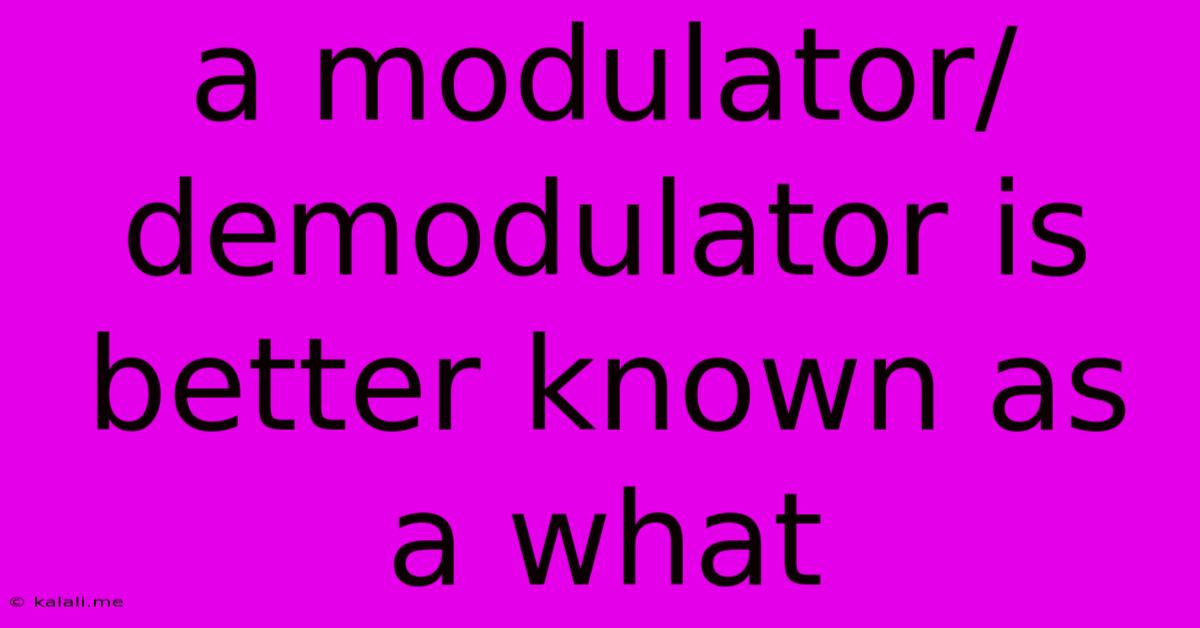A Modulator/demodulator Is Better Known As A What
Kalali
Jun 15, 2025 · 3 min read

Table of Contents
A Modulator/Demodulator is Better Known as a What? Understanding Modems
A modulator/demodulator, often shortened to modem, is a device that allows digital devices to exchange data over analog communication media like telephone lines or cable networks. This means it's the crucial link enabling your computer or other digital device to connect to the internet via older technologies. This article will delve into the functionality of modems, exploring their role in data transmission and why they remain relevant even in today's world of high-speed internet connections.
What does a modem actually do?
The core function of a modem is twofold, as indicated by its name:
-
Modulation: This process converts digital signals (the ones and zeros your computer uses) into analog signals suitable for transmission over traditional communication lines. Think of it as translating your computer's language into a language the telephone line can understand.
-
Demodulation: Conversely, this is the process of converting the received analog signal back into digital data that your computer can interpret. It's the "reverse translation" allowing your computer to receive and process the information.
Different Types of Modems:
While the fundamental principle remains the same, modems have evolved significantly over time. Some common types include:
-
Dial-up modems: These older modems used to be ubiquitous, connecting to the internet via standard telephone lines. Their slow speeds and reliance on a dedicated phone line have largely rendered them obsolete.
-
DSL modems: Digital Subscriber Line modems use existing phone lines to deliver significantly faster internet speeds than dial-up. They achieve this by utilizing frequencies not used by voice communication.
-
Cable modems: These modems utilize coaxial cables, the same cables used for cable television, to provide broadband internet access.
-
Fiber modems: These use fiber optic cables to provide the fastest internet speeds available today. Fiber optic technology utilizes light signals for data transmission, resulting in incredibly high bandwidth and low latency.
Why are modems still relevant?
Even with the prevalence of high-speed internet connections, modems remain a critical component of internet connectivity. While the technology behind them might be evolving, the core function – converting data between digital and analog formats – is essential for many internet connections. Even with fiber optic connections, a modem is often still needed to connect the fiber optic line to your home network.
Modems and Routers: What's the difference?
It's crucial to distinguish between a modem and a router. While both are important for internet connectivity, they serve distinct purposes:
-
Modem: Connects your home network to the internet service provider (ISP). It handles the conversion between digital and analog signals.
-
Router: Distributes the internet connection to multiple devices within your home network. It manages the flow of data between your devices and the internet. Many modern devices combine both modem and router functions into a single unit.
In summary:
A modulator/demodulator is better known as a modem. It's a vital piece of hardware that enables digital devices to communicate over analog lines, a function still critical even in our high-speed internet age. Understanding its role and the different types available helps you appreciate the intricacies of internet connectivity and choose the right equipment for your needs.
Latest Posts
Latest Posts
-
200 Degrees Centigrade Equals What In Fahrenheit
Jun 15, 2025
-
Gas Used In Fluorescent Light Bulbs
Jun 15, 2025
-
What Is The Least Common Multiple Of 27 And 36
Jun 15, 2025
-
What Is The Critical Pressure Of Steam
Jun 15, 2025
-
How Does Technology Impact Functional Regions
Jun 15, 2025
Related Post
Thank you for visiting our website which covers about A Modulator/demodulator Is Better Known As A What . We hope the information provided has been useful to you. Feel free to contact us if you have any questions or need further assistance. See you next time and don't miss to bookmark.